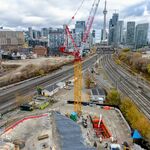PCC
New Member
This requires courage on the part of provincial politicians. For example, McGuinty could have easily absorbed the extra 2% of the GST cut by raising the PST simultaneously every time it was cut, just like the Nova Scotia government did. This would have easily given Ontario, an extra $2 billion/year in revenue today.
Like giving a drunken sailor the keys to the whorehouse. Last thing Dad needs is more of our money.
And they'd have had an extra $1B if they hadn't squandered it on E-Health.
Last edited:




